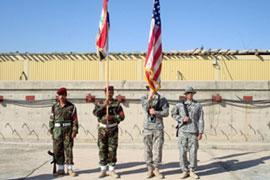Iraq debate on US pact disrupted
Parliamentary speaker adjourns discussion of agreement on US troop withdrawal.

Personal guards of Hoshyar Zebari, the Iraqi foreign minister, stopped al-Massoudi from snatching the document.
US occupation
The pact has the support of the ruling coalition but al-Sadr’s followers oppose any deal with the US forces and many Sunni Arab groups have reservations.
Iraq and the US signed the agreement on Monday, but it must first pass in the Iraqi parliament before it can take effect.
Hassan al-Shimari, the head of the Shia Fadhila party, has said he will vote against the deal.
“We won’t vote in favour of the security pact which has recently been sent to the Iraqi parliament. We hope that the political powers will deal with this matter with pure patriotism, far from party and personal interests,” he said.
Even Washington has some reservataions about the agreement as under its terms the US will have to give back Iraqi air space and take troops off the streets by June 2009, before leaving the country entirely by 2011.
Maliki speech
In a speech on state television on Tuesday, Nuri al-Maliki, the Iraqi prime minister, attacked critics of the pact, saying they wanted the Americans to stay so that they could fight them.
“Truly, they [the pact’s critics] want these foreign forces to stay in Iraq because their presence on Iraqi soil has become for them, consciously or unconsciously, a political manoeuvre,” al-Maliki said.
“In the past, some political factions carried banners demanding we schedule the withdrawal of foreign forces,” al-Maliki said, in an apparent reference to the followers of al-Sadr.
“Regretfully, these same political factions turned away from the nation’s demand to achieve this withdrawal … which has become a reality in the content of the pact,” he said. “Some opposed it even before a first draft was written.”
Tacit support
Al-Maliki said the Iraqi cabinet had reservations about the pact, but saw it as the best way to return Iraq’s sovereignty.
 |
| The pact will see US forces withdraw from Iraq by 2011 [AFP] |
Grand Ayatollah Ali al-Sistani, Iraq’s most influential Shia cleric, has signalled that he will not oppose the pact, but only if it wins wide backing from across Iraq’s sectarian political divides.
“The representatives of the Iraqi people in parliament must take on a big responsibility … and each must be up to this historic responsibility before God and the people,” a statement from his office said.
“What [al-]Sistani told political leaders is that it is necessary to end the foreign presence in any deal,” the statement said.
Al-Sistani, who was largely silent on the deal while it was being negotiated, wields vast influence on majority Shia population and a negative word from him could have sunk the pact.
Iranian opposition
Al-Sadr’s office has interpreted al-Sistani’s position as meaning that all blocs in parliament must back the pact, effectively giving opposition groups a veto.
“[Al-]Sistani said in his statement it is necessary to have a national consensus on this agreement and not a simple majority,” Hazim al-Araji, a senior aide to al-Sadr, said.
Iran, which also has much influence among Iraqi Shia politicians, opposes the pact.
Ali Larijani, Iran’s parliament speaker, urged Iraqi legislators to resist the deal, saying Washington’s main aim was “strengthening comprehensive US hegemony in Iraq”.